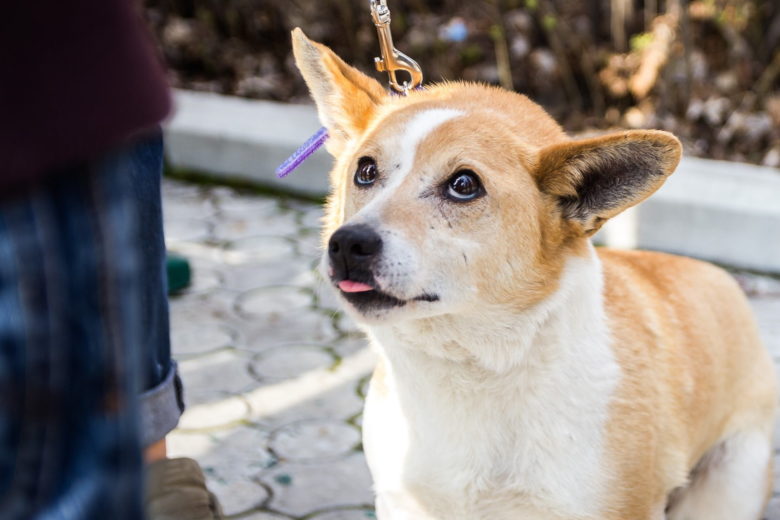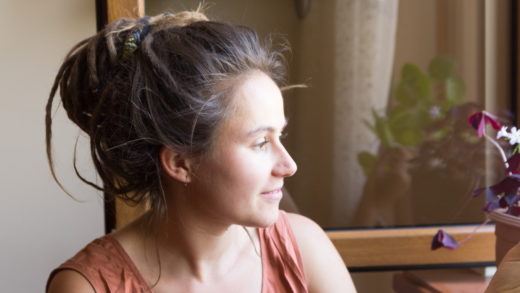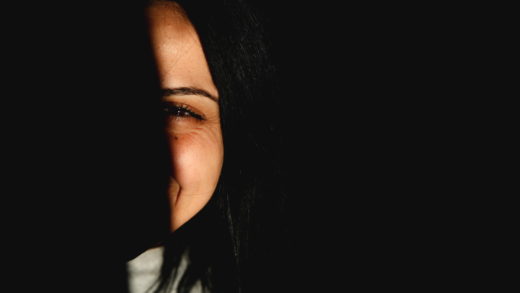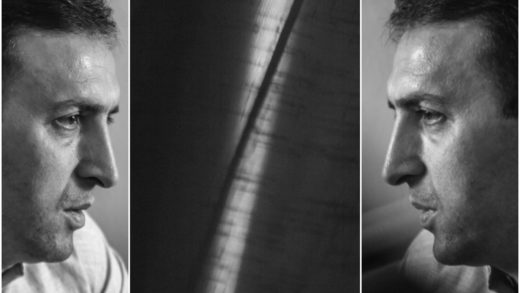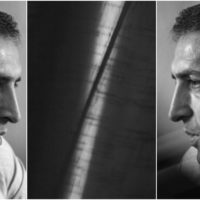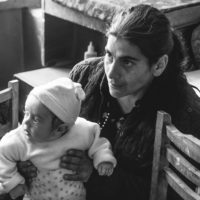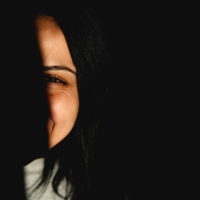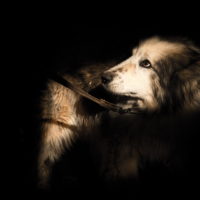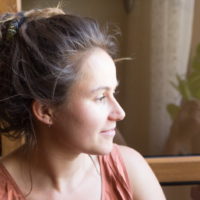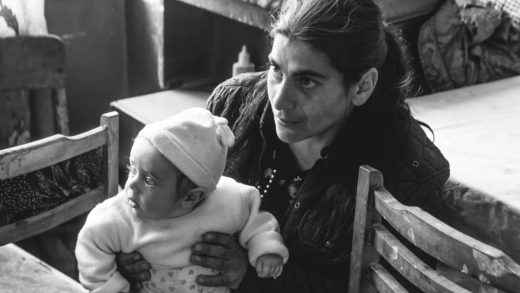Doctor with a tail
Author: Hasmik Hovhannisyan
Editor: Fëdor Kornienko
Photos: Fëdor Kornienko
[post_published]
[show_post_categories show=”category” hyperlink=”no” parent=”no”]The diary of a therapy dog that was written randomly in bits and pieces, being constantly interrupted by the cat climbed the dog to sleep on its back, by passers-by who had to be barked upon from the window, by delicious smells from the kitchen that infiltrated the nose and dissipated the remaining thoughts, and so on.
15 min read
The day I met a girl with chime-like laughter
At the sight of a blue bag with a mouse and a cat drawn on it, I immediately jumped up from the chair and ran to the door. A blue bag means a beautiful collar — green with flowers or blue with a butterfly, kids hugging me, and a bunch of goodies.
As always, she rushed about the room, collecting things into the bag. Standing on my hind legs and stretching out my head, I observed and made sure that Hasmik would put as many heart-shaped dog candies with multi-coloured jelly there as possible.
Along the way, she: poured water for the dogs and the cat who stayed at home; put turtle food into the aquarium; shouted that we were getting late; checked the kitchen door so that Puchur, our cat with chronic kidney failure and on a strict diet, wouldn’t climb into the kitchen and eat up all the things that were harmful for kidneys; at the last second, she realized that a skirt could correspond to her self-awareness more today than the shirts she was wearing and ran off to change her clothes.
She kept shouting as she hit a door jamb, then through the window she saw Lotta, the cat who disappeared in the morning and who needs to get daily drips of artificial tear into her eyes since she herself can’t produce one; uttered a word that I, as a well-bred dog, would not allow myself to repeat; flew back to the kitchen and began to fumble in three huge packages with medicine in search of drops…
Fedor and I sat on a wooden chest by the window and, having become wiser with experience, silently waited until Hasmik’s tumultuous activity would dry up so that we could proceed into the car.
We entered the narrow white door of the orphanage exactly 12 minutes late and immediately ran to the gazebo where children were waiting for us. Both children and educators reacted to our lateness with understanding: everyone knows that we have a lot of different animals and it’s not so easy to get out of the house.
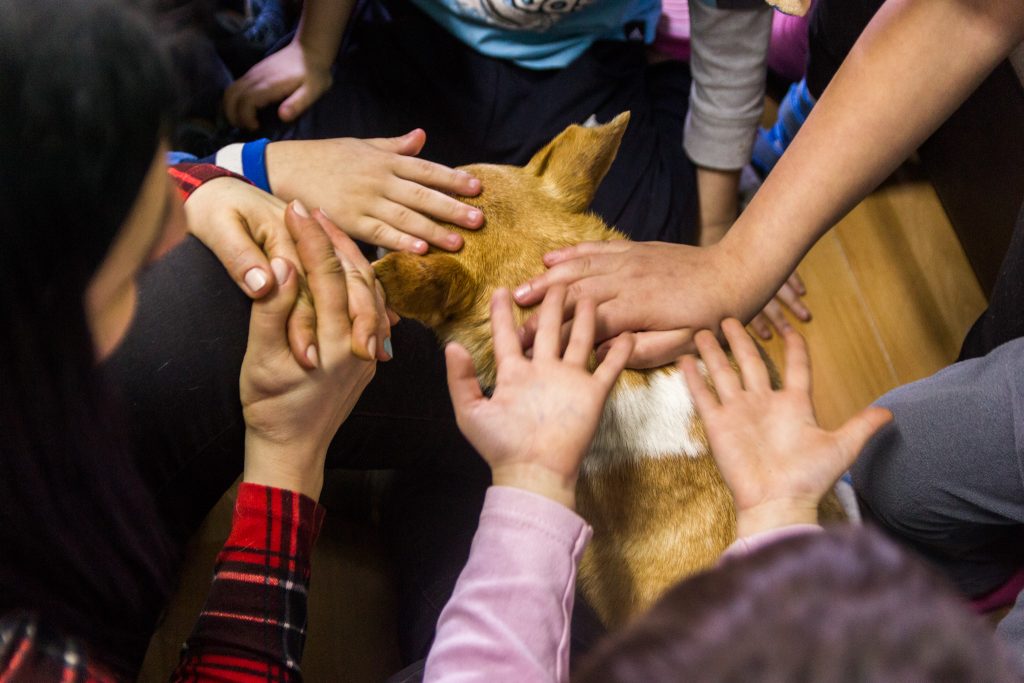
They surrounded me and rushed to stroke several hands at once. I seriously began fearing that they would tear me to pieces, but then Maneh appeared.
She confidently took me in her arms, just like an adult. Children often squeeze under the neck, choking me because their hands are small and weak, and I’m too heavy for them. But she neatly took me up and put me on her lap. I relaxed and covered my eyes: no matter how I love children, it’s sometimes difficult with them, especially if they rush me with the whole group, but with this girl, I feel good and calm. She realized that I like it and gently kissed my forehead.
She is 15 and her eyes cannot see. She is feeling me. She doesn’t stroke like other children, she’s just feeling. In our first meeting, she was asking questions about me: which parts of my body are coloured of honey, and where I am white; did I cut my hair or was it so short to begin with; what kind of flowers were on my leash and whether I was smiling.
Maneh didn’t always live in the orphanage. Once she had a family and a dog with whom they were born on the same day. Maneh said that she was sad and really missed her dog, but she says that since she met me, life has been much more fun.
It’s cool in the gazebo where we are sitting. Maneh gently runs a palm over my face and says: “Mickey smiles indeed, really-really she does.” And laughs. Like a chime.
Children surrounded me, pushing each other, trying to pat me on the head. I close my eyes again and start counting imaginary chicken bones up to ten. This helps to survive in the chaotic noise of any orphanage. Chicken bones are my favorite treat from my previous life when I hadn’t been a therapy dog yet. Now I’m not allowed to eat them. Because I can have that… that… stomach perforation, that’s it.
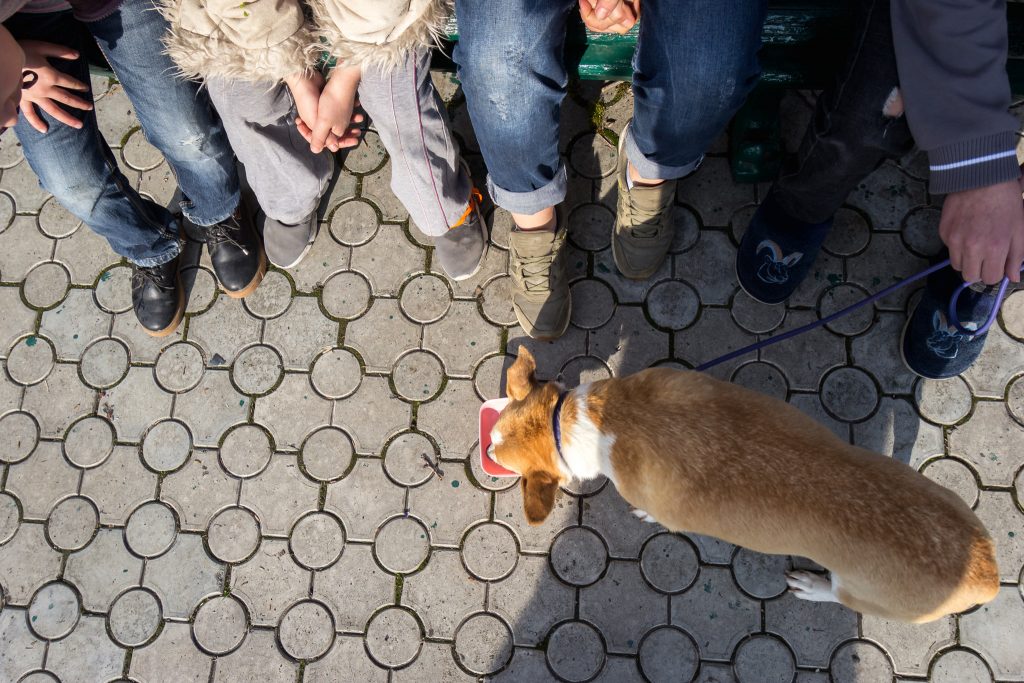
I try not to look at the black little bag with refreshments thrown over Hasmik’s shoulder. So that nobody would think that I work because of the food. No-no, it’s out of pure love for it. But it wouldn’t hurt to have a meal or two: I’ve been doing my best for 16 minutes already!
Maneh takes control of the situation. She strictly tells everyone that they’re going to squeeze me to death like that, so they must take turns petting me. Children’s obedience lasts only for minutes, but I am still grateful to her.
We have a new boy, and he is afraid of me. Maneh takes his hand, gently and quietly persuading him to simply touch me with one finger. He takes his finger and gently runs along my back. After a minute, the whole palm of a laughing child strokes me.
Valya really wants to walk with me, but she is in a wheelchair. Maneh pushes the wheelchair, and Valya takes my leash. Since Maneh cannot see the road, she often goes in the wrong direction and leaves it, so Hasmik tells her to listen to the clatter of my paws, as well as feel for the direction the leash is stretching to. Since I know how to walk in a straight line, it mostly works, and I try hard not to look at the grass, where the huge grasshopper is begging for me to eat it. Here’s my education for you.
I will not be able to return Maneh’s vision no matter how much I want to, but I can help her feel the surroundings.
— Who wants to feed Mickey Mook? — Hasmik finally brings up an actually good idea.
Maneh lets other children feed me, and she goes to Fedor. She once told him that she had a dream — to learn to take pictures, and Fedor started teaching her from time to time. It’s pleasing to look at them: Mane tries to find simple Armenian words so that Fedor understands her, and Fedor tries to explain to her how to feel something that she cannot see. Judging by the photograph of me that she took, they will do great over time.
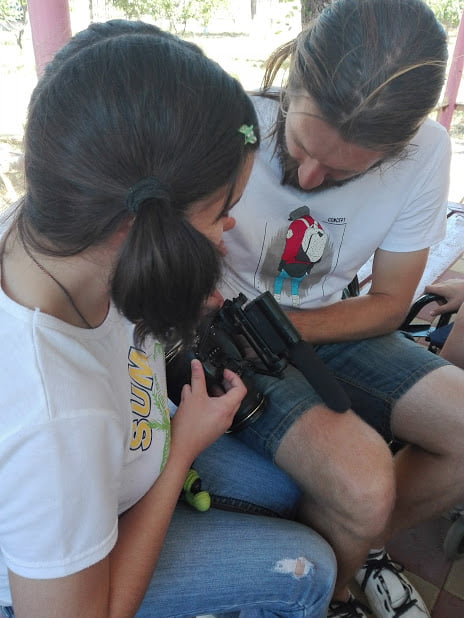
The day I was treated to a piece of chocolate
Today, we were six minutes late because the groom didn’t lock the Sorbonne’s door, she ran out and, as always, started chasing the dogs around, throwing kicks left and right. Sorbonne, if you look in her passport, appears to be a horse, but between us dogs, we call her the red devil — she’s that annoying. Sorbonne was successfully brought back into place, and we went to the orphanage.
The children sat in a semicircle — some in their wheelchairs, others on the grass, — waiting for us. Today I had to work with all of them, but especially with Suzy, Narek, and Varduhi.
Susie, as always, gathered branches and folded “fingers” out of them. Susie has autism.
She lives in her own world, which is hard for others to understand, and it’s difficult to drag her out of it. She does only what she wants, otherwise she starts screaming.
She can scream for a long time and quite loudly, too. Susie stubbornly refused to pay me any attention for the last three sessions. Her eyes couldn’t focus on anything.
Someone else would have left her alone long ago, but I decided not to give up and just follow her everywhere. When I was almost desperate, Susie’s wandering eyes suddenly stopped. She looked at me and saw. Susie smiled, and her hand reached out to stroke me. Finally! She seemed to like it. She even laughed with pleasure. Of course, she would! Hasmik spent all morning bringing beauty and softness to my coat, almost tearing my skin off with an inquisitor’s tool, which she calls a brush, and the process itself — combing.
When Susie looks into my eyes, strokes me and laughs, I have a feeling that I am helping her to get out into our world. As painlessly as possible.
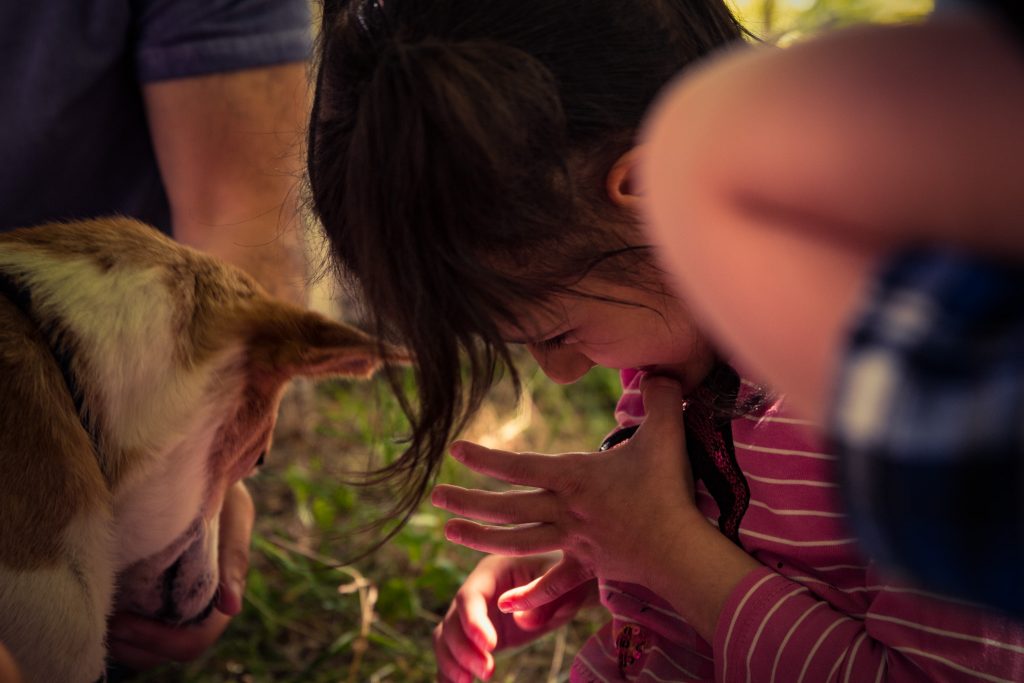
Narek watched the process of working with Susie and smiled a little. For the first time, he had to stroke me alone, without a tutor. Narek has cerebral palsy. He strains from any strong emotions — both joyful and sad. When we first met, he generally refused to communicate with me. He made a frightened face, pulled his teacher by the sleeve, and kept saying: “Let’s go from here”. Then he agreed to stroke me, but only with the tutor.
Today, the teacher was on vacation. Another teacher promised to make a video and send it to his tutor, showing “how well Narek was doing by himself”. The boy liked it. He began to stroke me so well that my team decided: it’s time to put Mickey on Narek’s lap!
My team is Ardem, Hasmik, and Fedor. Ardem lives in Canada, he came here for only three months. He knows that in order for us to work well, we need to fully eat and live in comfortable enclosures, so he helps us with food and all kinds of dog household needs. He also accompanies me and our other dogs for therapy and generally makes our life at Centaur Animal-Assisted Therapy Center better. And we can focus on providing care for the children who live in orphanages.
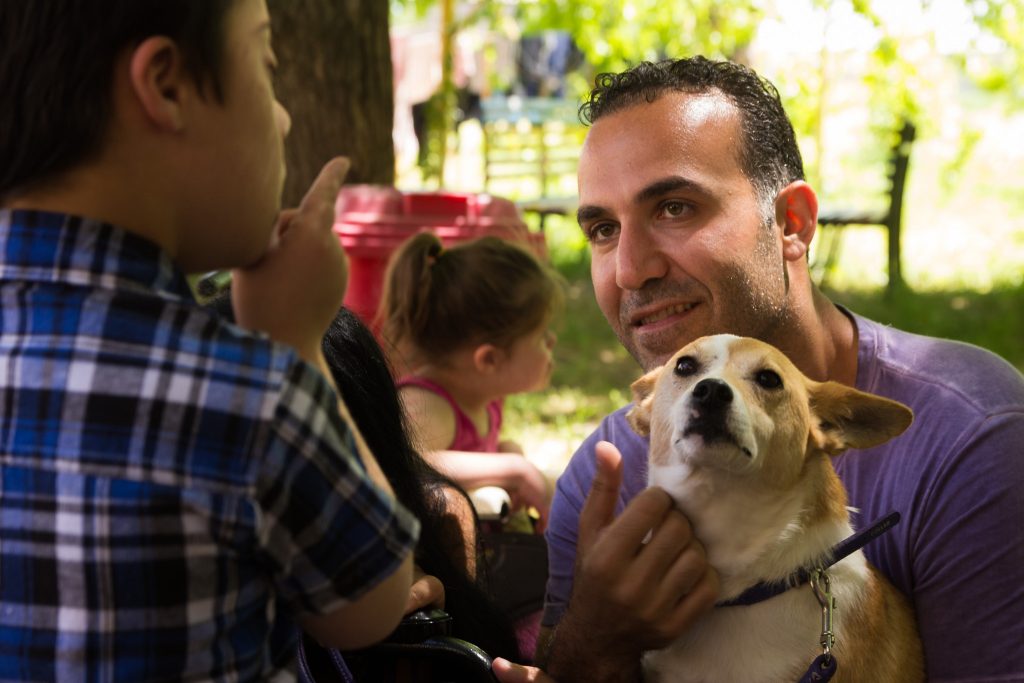
I like to drive in a car with him from one therapy to another. He sits on the seat delicately, does not push around, and always leaves me a lot of space so that I can lie down comfortably. I always leave a bunch of my hair on his trousers, but he just smiles at it.
Fedor takes care of us, takes photos and videos, helps children overcome their self-doubt, and answers their never-changing question: why is his hair so long, even though he is a man?
Hasmik makes sure that I have less fun and work more. Really. If at least one child continues to be afraid of dogs by the time we leave, her mood goes down the drain.
Hasmik and Fedor live with us and love us. They love us most when we silently sleep. I’m pretty quiet, but the remaining 40 or so dogs love to arrange howling concerts late at night. For me it’s nothing, but people claim that they are slowly going mad.
So, these nice people decided to put me on Narek’s lap, which neither I nor the boy completely approved of. When Narek strains, he pushes himself out of the wheelchair. I’m afraid I won’t keep my balance. Narek, on the other hand, was scared by the very prospect of being in such close proximity to me.
But who asked us? I was picked up and put in the wheelchair. The boy had an unhappy face, his muscles were ready to stretch like a spring, but he really wanted the teacher to be proud of him. He squinted at the phone: do they record it already? He gently stroked me, then again, and again. I found a position convenient for maintaining balance: Narek’s wheelchair is not designed for the two of us.
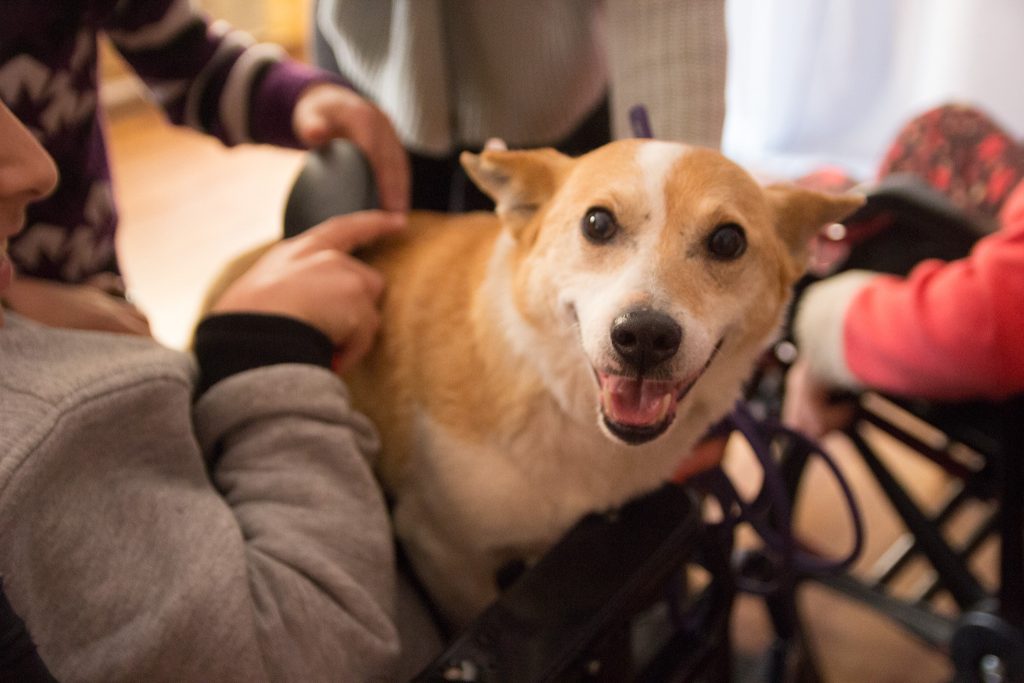
Narek became bolder more and more. Soon he hugged me with one hand and fed me with the other. Then he hugged and kissed me on the forehead. His muscles were completely relaxed. In my opinion, we did a good job.
With Varduhi, things were more complicated. She is terribly afraid that I will bite her. As soon as Ardem picked me up and brought me to her, she clenched her fists and covered her face in disdain. She closed her eyes so as not to see my “terrible jaws.”
Hasmik herself was very scared of dogs for a very long time, and in general, of all animals. She always tells the children how bad it was — to be afraid of something so much, and how glad she was to overcome her fears.
It works well. A person who has never been afraid of us cannot fully understand what others are afraid of, and often says nonsense. For example: “Are you a boy, aren’t you ashamed?” Or “You are so big but so afraid of a tiny dog?” Of course, this approach will not help anyone.
And now Hasmik looked at Varduhi thoughtfully and in a serious tone asked: “Are you a human or a bone?” “Human,” slightly confused Varduhi replied. Hasmik sighed in relief and assured the girl that she should worry, for Mickey Muk, that is, I, only eats bones. I have already learned to play along with this and portray an absolute disinterest in children in terms of food. Varduhi opened her fists and stroked me.
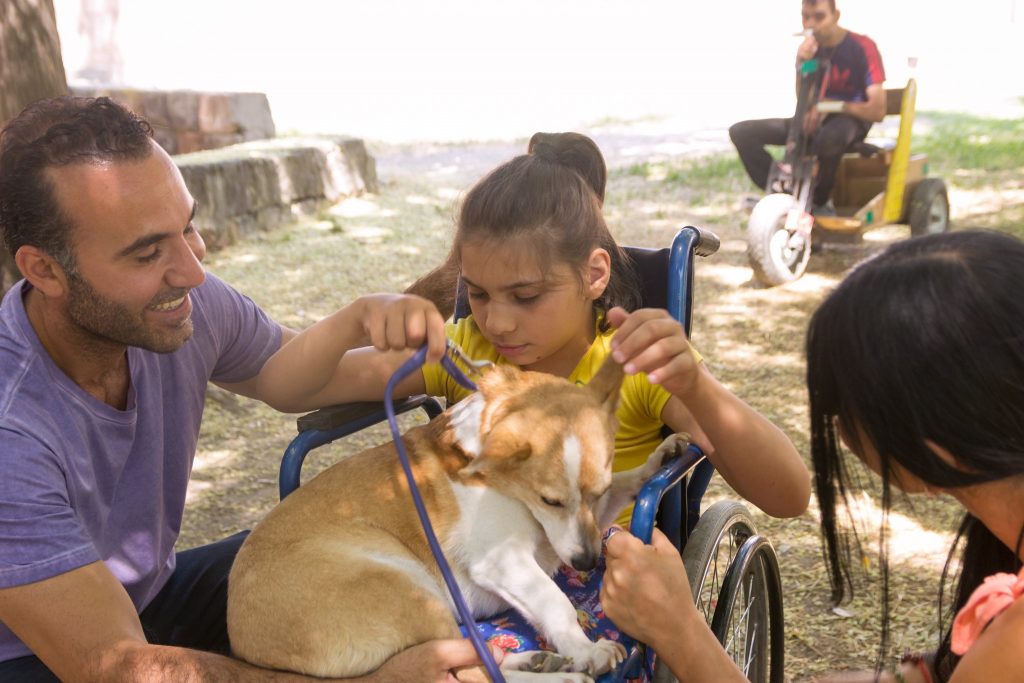
After therapy, we went to a cafe on Cascade, where everyone knows me, and I always get a bowl with water. All their attempts to sneak a few snacks to me, unfortunately, stumble upon Fedor and Hasmik’s formidable frowns. But today I got a huge — by their standards — a piece of chocolate cake the size of a human finger. Well deserved, I must say.
The day we changed minds
Today, the children have walked me a lot. Walking me is their favorite pastime. It would be fun for me, too, if it wasn’t for my people. They carefully observe that I don’t disappear suddenly into the grass or run to see if there are any mouse holes around. I am sure that if they took off the leash from me, it would have been better for everyone. I would teach kids how to catch mice.
Since other dogs are unlikely to read my writings, I will share the secret of how I do it. Mouse households have two holes — entrance and exit. I stick my head through one hole and start sneezing frantically. From the raised dust and noise, the mouse jumps through another hole in horror, and there I catch it. I’m sure the kids would love to try it, too. But my team has a different opinion on this matter, and we keep decorously strolling around.
Narine sat in her wheelchair and looked at us with a sad expression.
— Want to take a walk with Mickey Mook? — asked Hasmik.
— I can’t.
— Why not?
— Maybe you didn’t understand, but I’m not sitting here for my pleasure. I can’t walk.
Narine is very tender, but also very stubborn and strong-willed. Sometimes she can be harsh. In addition, she only acts on her own will, and if she isn’t the initiator, she won’t do a thing. It took a few lessons before we got her to touch me first and then to pet me.
On the first day, she didn’t even let me approach her. She said that she did not like dogs, that she hated having dog hair on her clothes. Narine looked gloomy and perhaps sad back then. She just returned from home, from her family that can’t decide if they should abandon her completely or “take her back” instead. From time to time, they took her back into the house, only to return her in a couple of days.
Now she smiles when she sees me. She hugs me, gives me food, and stoically endures it if I accidentally lick her finger while taking the treat. She really doesn’t like dog saliva. I understand it and try to be careful.
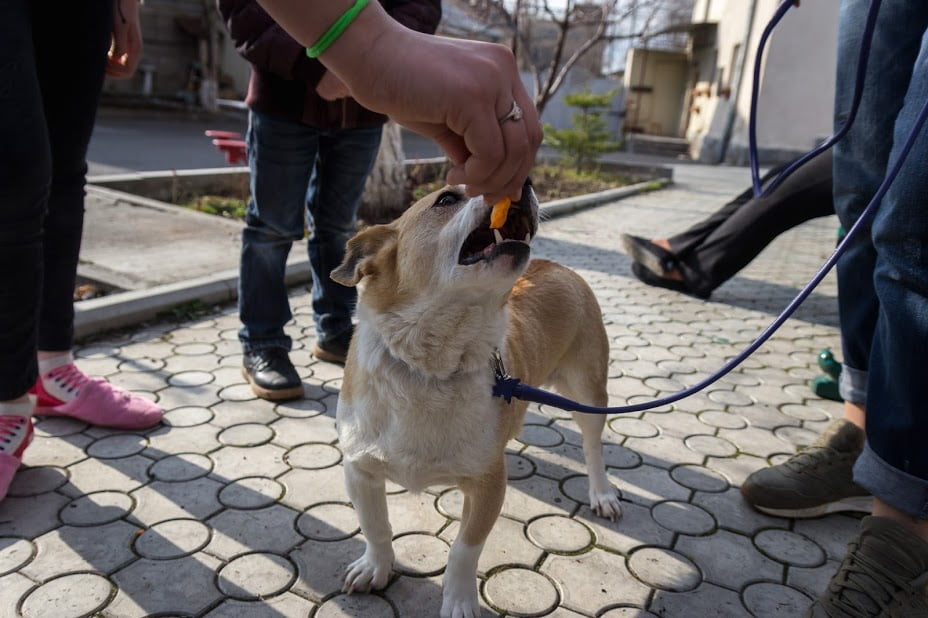
Hasmik told her that she doesn’t know the extent of her capabilities herself. And that with me she can walk even in a wheelchair. Hasmik asked for volunteers to help Narine, and we had a lot of raised hands, so some casting was in order. While Narine was holding my leash, one child was pushing the wheelchair, another was watching for wheels not to jam my paws, the third was pulling Fedor by the sleeve, and pointing for good photo possibilities.
Although usually everyone is supposed to walk with me only for one lap due to time limits, as well as not to exhaust me too much, this time everyone agreed that the case was special and an exception can be made. So we made three laps with Narine.
Her look somehow changed. Usually, when someone walked with me, the rest ran after, cheering, measuring the circle, making sure that everything was fair. But the guys in wheelchairs just sat in the gazebo and waited for my escort to return and tell them “how cool it was”. They waited meekly, accepting how the things stood, but not even thinking that those things could be different.
Walking with me, Narine was part of the party that she used to look at from the gazebo and which she wanted to belong to.
She had a look of surprise and free, undisguised joy from a sudden understanding: if she could walk with me like other children, then there must be a bunch of other things that she could do if she wanted to.
It was a very special day. I usually get very emotionally tired with Narine, but today I felt very light. Do you know why? Causing a smile on a child’s face or relaxing their muscles is important, no doubt. But to help them rethink themselves and their abilities, “I can” and “I can’t” — that’s why we are doing this therapy! From this day onward we started walking with children in wheelchairs, too.
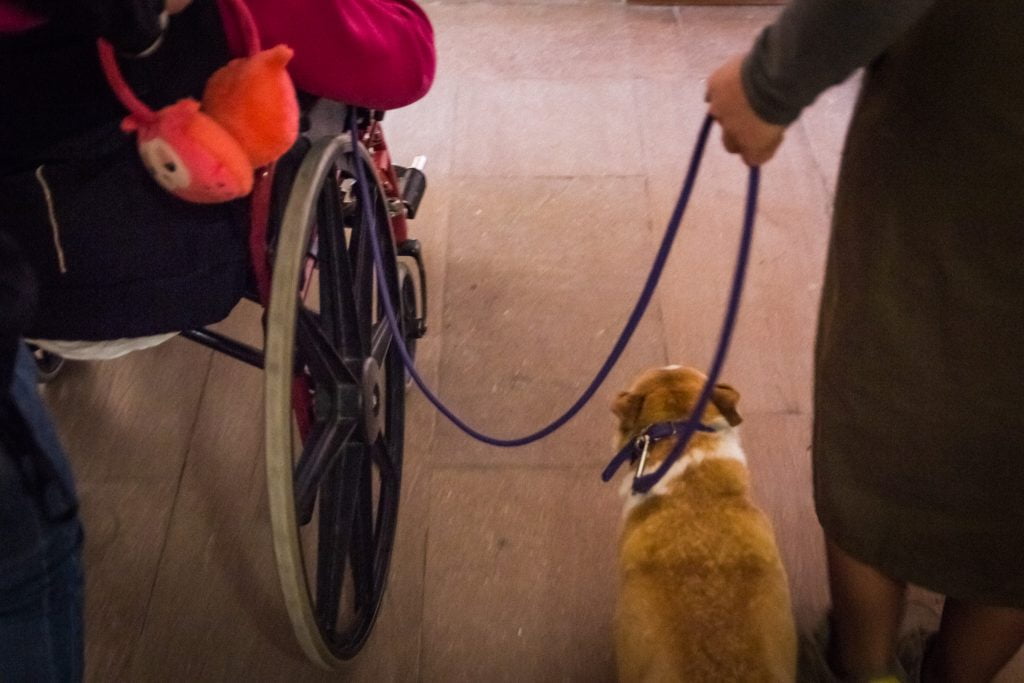
I suppose I could get treated some chocolate cakes on this today, too, since changing people’s minds is such a labourious task, but, unfortunately, it was only me thinking so. The rest seriously worried about my liver and eyes, which could get damaged from the sweets.
After therapy, we went to change the minds of people on Yerevan streets, too. Walking the streets before going home has long become our habit. Hasmik calls this part of the educational process.
People in our country don’t always treat animals well. Most of this comes from ignorance. Many people are sure that we only know how to bite. And that they are so delicious that we will definitely want to take a piece of them. They also think that we walk around the world, collecting all kinds of infections, so that when our internal pantries are getting full, they will pass them on onto the people.
So many people shy away from us, demand to put muzzles on us, and leave as soon as possible. Our educational process is not to bark at them in return, but to smile in a friendly way and talk. For example, Hasmik says that we are therapeutic, that we never bite, that we regularly go to the veterinarian for health checks, that we help people. It’s very important for them to know that they can somehow benefit from our existence. Only then Hasmik says that we are all former street dogs, and mosts of us are not purebred.
The main thing is for them to prick up their ears. Then they will certainly accept and love us at some point, and maybe this acceptance will extend to other street dogs. Once, a mother on the street allowed me to put my head in a baby stroller and lick her baby. Aggression won’t get us anywhere.
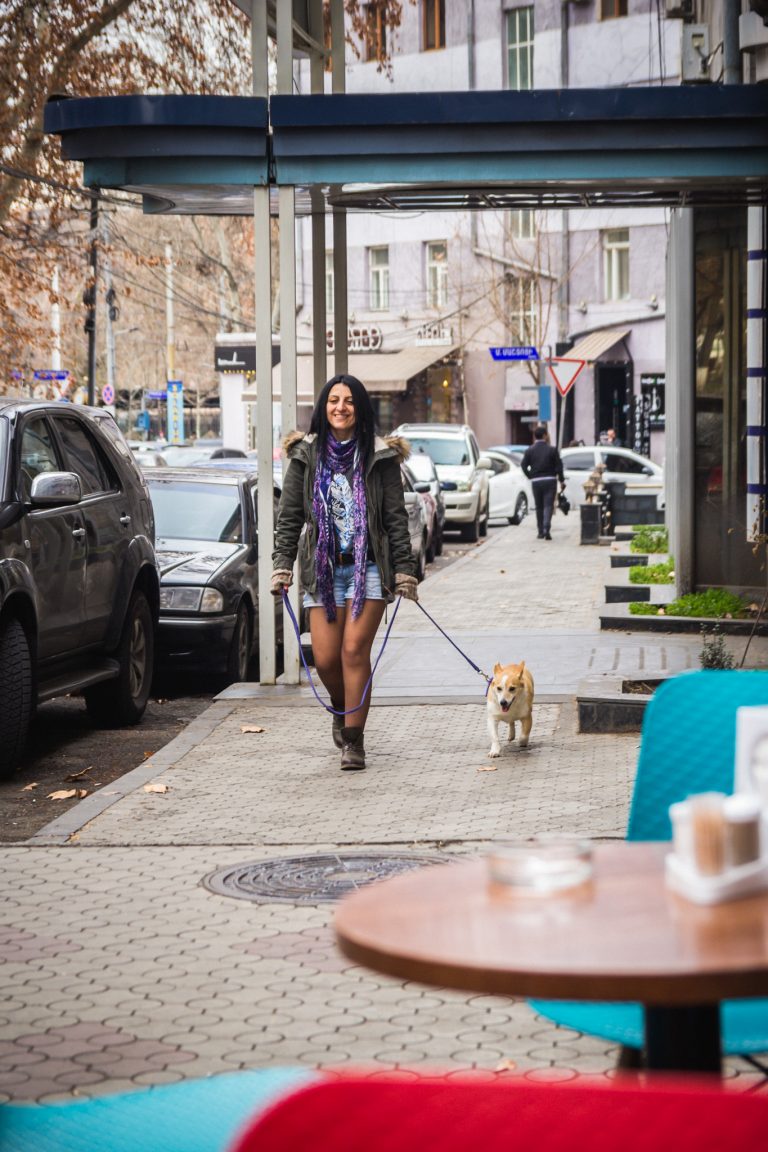
Then we went to a very pleasant establishment where Hasmik and Fedor buy dog food for us and where the host always has a treat or to for me. Since the whole back seat was occupied by 20-kilo bags, I moved forward to Fedor’s lap, and we drove home. I stuck my head out the open window, swallowed the wind and, I’m not gonna lie, I was very pleased with myself.
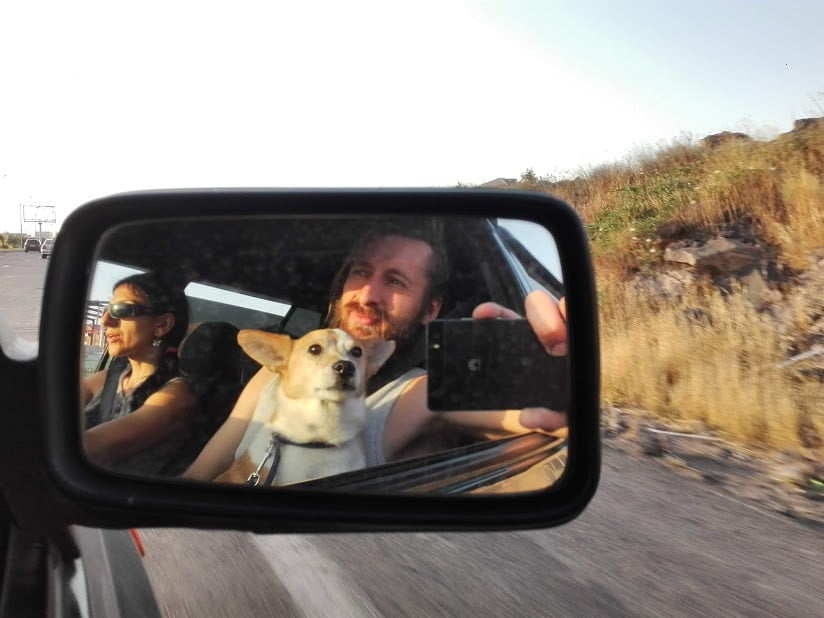
The day we were all ourselves
Today I noticed that the children became more caring with each other. Having always been reserved, Christina suddenly began talking to me open-heartedly, and Archie made friends with a lilac elephant.
It was in a crisis center for children from difficult families. In general, we go to therapy two days a week. We have two orphanages, one crisis center, and one rehabilitation center for children. Several times a year we go to all sorts of children camps.
I like my work, but it’s not easy. My children are very different. Some need a very gentle and patient approach.
Children may get scared, scream, want to kick me, and I should lie still and never bite them back (sometimes I really want to).
Barking isn’t an option either. One has to endure even when a cat is looming in front of my nose. Don’t get me wrong, I treat cats nicely, one of the cats in our house even sleeps on top of me. I don’t eat them, but I really like to chase them a little bit. But I can’t. After work — whatever you want, and during therapy — strict discipline and endless patience.
There are six of us, visiting dog therapists. The rest are engaged in therapy at our center in Ushi. Most of us had a difficult life, and we all went through therapy ourselves before starting to help children. We are also going to go to adults, but in the future: now we do not have enough people on the team that would accompany us on long journeys.
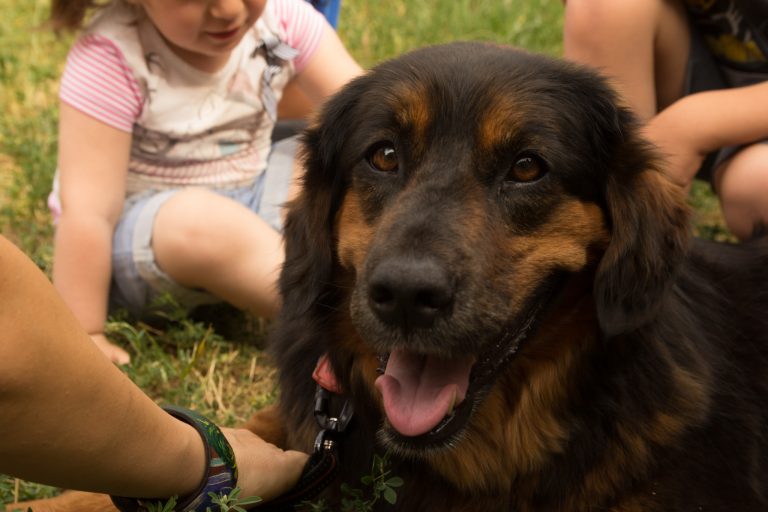
People in the orphanages we go to usually have severe physical disabilities. In the crisis center, children mostly don’t have them, but there are a lot of emotional wounds that we try and help to heal. Here the children live temporarily until difficult situations in their families are resolved.
In the early days, the children tried to take me from each other, pushed and kicked — everyone wanted to be the only one to have a chat with me. And today they are much more considerate of each other, making sure that even the timidest kids have a chance to spend time with me. If anyone is scared, Hasmik is immediately informed about it and with all their might they work with the fears and get rid of them.
I think their care for each other stared from taking care of me. Well, see for yourself. The first thing they should do is filling my bowl with water and making sure that it stays full throughout the session. We play in the grass, and thorns can get tangled in my coat, so they pull them out. And in the season when I shed, children comb me. If I’m tired, then we don’t do walks: everyone knows that I need to be taken to a shady place to rest.
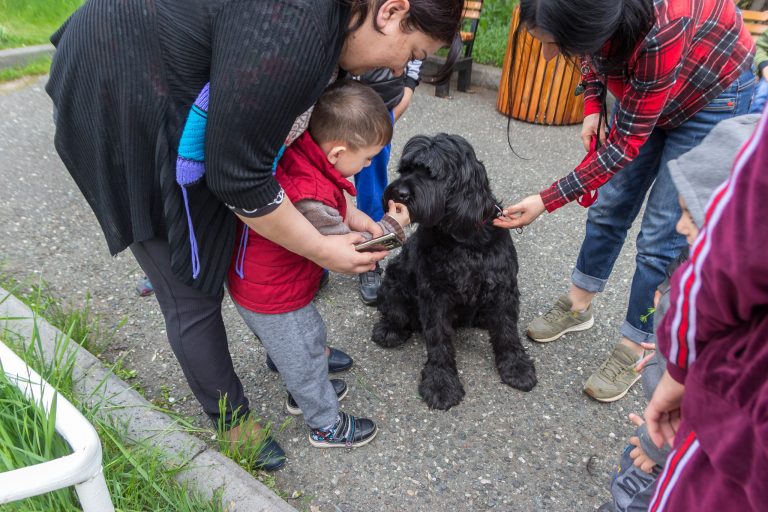
Moreover, children are engaged in our studies. They’ve been through a lot in their difficult families. Often they have a feeling of uselessness and insecurity. And suddenly they are entrusted with an important matter: to help train a therapeutic dog. That gives an immediate self-confidence boost!
For example, last week they came up with a game for our plump Tatik, who needs to move a lot in order to lose weight: the children stood in a big circle on the basketball field, and everyone had a treat in their hand. They took turns calling Tatik, and when she came running, they gave her refreshments. I think that sweets immediately replenished the calories that Tatik spent while running, but, as always, no one was interested in my opinion. In addition, it is beneficial to the process to have a personal interest in the training.
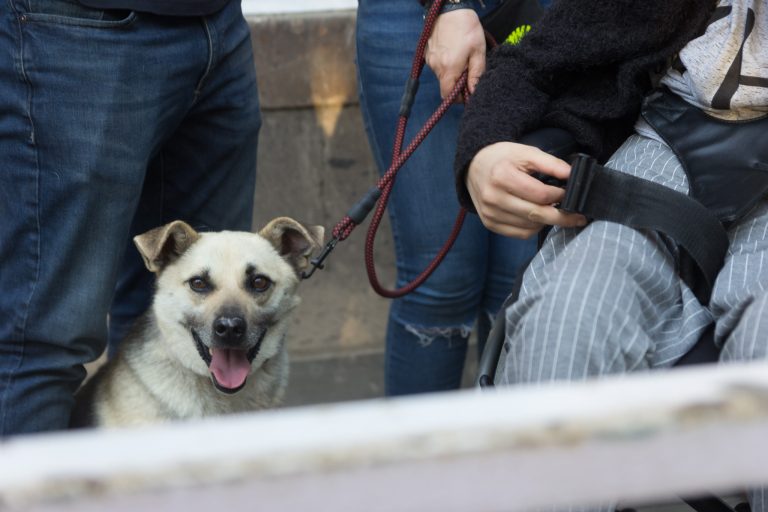
Today it turned out that Archie is mortally afraid of the big lilac elephant that stood in the middle of the walking path. I immediately realized that the elephant is a toy, but Archie has a distorted reality, and he always confuses it with his fantasies.
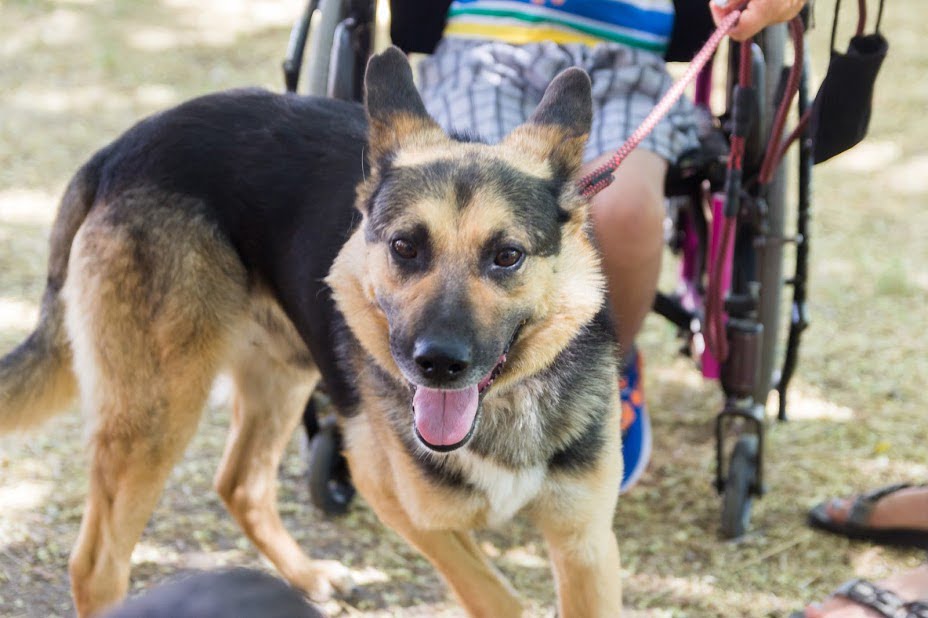
If the dogs knew how to laugh, I would roll with laughter, watching half of the children leading Archie to the elephant with baby steps and the other half pushing the elephant to Archie under Hasmik’s leadership, who kept saying: “Good elephant, look, Archie, as I pet him like a dog.” And they did it. By the end of the day, Archie licked an elephant, rubbed against it, and wanted to take him home with us.
Hasmik, knowing that I always give iron slides a wide berth, came up with a real test for me: the children led me up the stairs on top of the slides, while she stood below and called me to come down. And the only way to so os to slide off.
I think it looks like blackmailing of some sort, but Hasmik thinks that the therapy dog should not be scared of anything. And she knows, after all, that I will go to her no matter what, I can’t stand it when she is far away.
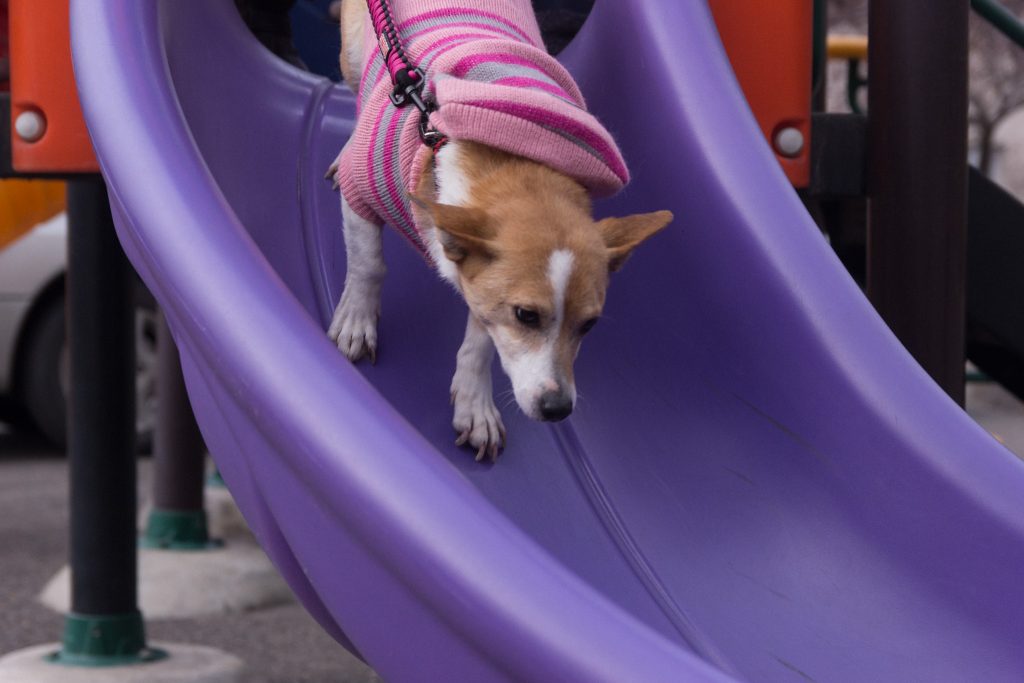
It was really scary. I started licking my nose quickly. I always do this when I’m stressed. I don’t like instability and heights. Not higher than a chair, please. The children cheered me up. They surrounded me and ensured me that I was safe from all sides. In the end, I made my mind. Oh my go-o-od! Hasmik caught me and everyone applauded. And I got a lot of fine refreshments as a gratification.
We tried a few more times. It’s not that I’m not afraid at all anymore: I’m still scared, and I’m not showing off by hiding my horror, but I’m sliding down nevertheless, I’m overcoming my fear. In my opinion, this is what real courage is.
Then Christina walked with me for a long time, and in the end, we sat on the grass under a tree. She combed me beautifully, then hugged and talked for a long time about her life and experiences. Christina loves me and our other dogs very much. She wandered from one institution for children to another for almost her entire life. When you talk to her, it may seem that Christina likes to manipulate in order to get sympathy from you. But I know something more: in fact, she wants attention and love, which she always missed greatly since being little.
But Christina doesn’t need to pretend someone else to be with me. She knows that dogs in general and I will accept her for who she really is. It doesn’t matter to us if a person has any kind of problem. She knows that we don’t pity, something that every person with physical or mental trauma hates. We just accept. Kristina hugs me, and it becomes easier for her to just talk, and be herself.
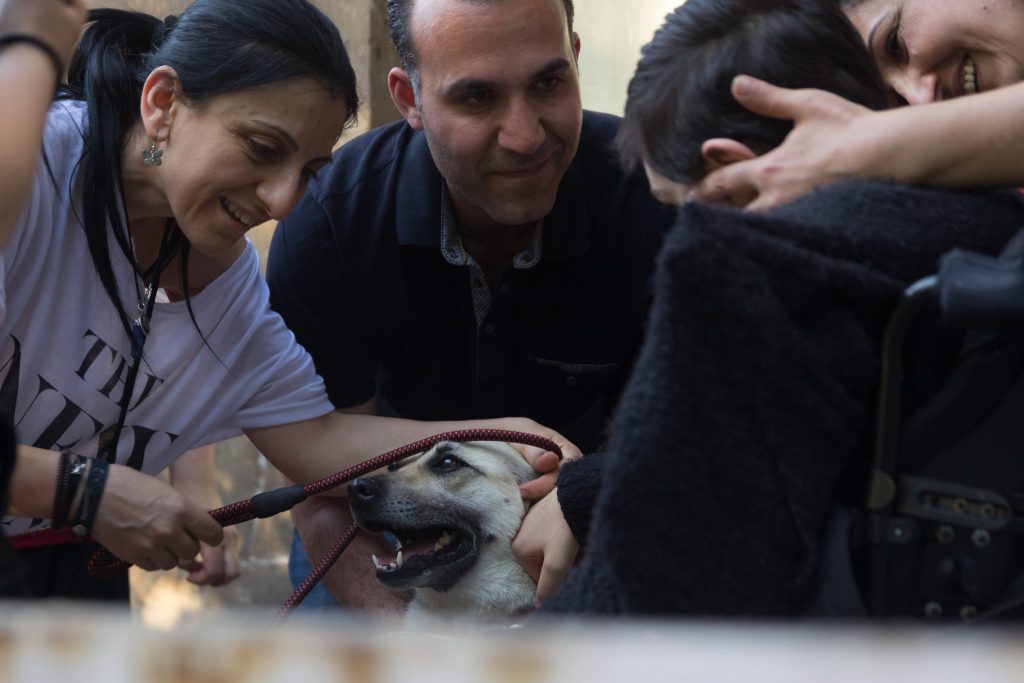
The day when I thought about my life
When you are eight years old, which is already pretty decent, you are occasionally visited by all sorts of thoughts about life, the reason behind our existence, and your place in the world.
Today I ran away from home. Sometimes I do this when they let me out to the toilet. Because I really like catching mice in the field, but at home, there aren’t any mice around. But today is different: I went down to the brook and just lay there and gave life plenty of thinking. Sometimes I have nostalgia. It seems that I live for a very long time and have already had several different lives at least.
In my first life I was a puppy. I lived in a rich city house, ate from the owner’s hands, and slept on a couch. Once we drove in her posh car and stopped to buy apples along the way. There was a bush on the road, and I was suddenly interested to see what was inside. I slipped out the open door while the hostess was paying. She did not notice this, and while I was sniffing enthusiastically, the car left.
I was picked up by the boy who was selling apples and carried to his home. Thus began my second life. I began to guard his house and seven more houses around. The owners could leave and not lock the doors, since no one would have thought to meddle with me. At first I was sad, and I missed my sofa, but then I got used to it.
Now I lived in the yard, and everyone was scared of me. When guests came to the owners, they either tied me up or locked me in the basement so that I would not eat anyone. But I just barked at strangers, as any normal dog should do.
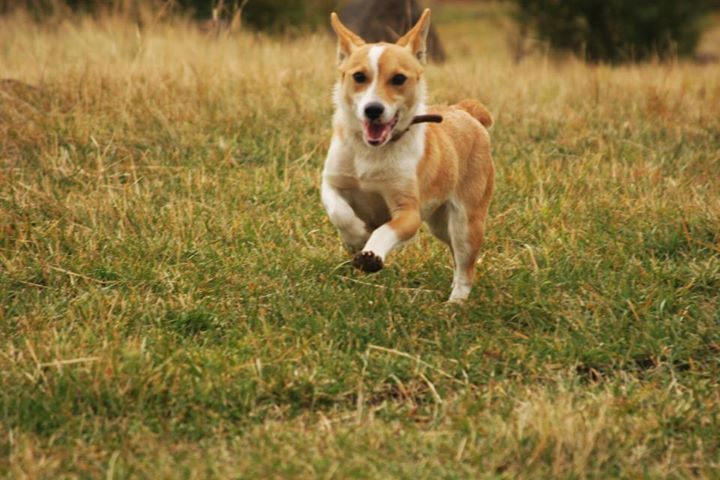
Once in the winter, the owners closed me, pregnant, in the basement and forgot. They left for their relatives in another village for a few days. I gave birth and killed my puppies. We, animals, if we see that our cubs cannot survive or that they will be doomed to torment, we don’t force them to live. I had no water, no food, and therefore no milk to feed the puppies.
When people returned, they were in horror. The landlord tied me by a string and dragged me to a dilapidated stable nearby. It was here that Hasmik saw him passing by. The landlord told her that he was tying me to a post as a punishment: “So that she would die of hunger, because what kind of mother would such a thing?”
Hasmik took me away from him, saying that I’ll be good, and he’ll be unfortunate to lose such a fine dog. The next morning the man couldn’t get up from bed for a whole week— he twisted his back, and he told everyone that Hasmik spelled a curse upon him. The following morning a line of people formed in from of Hasmik’s house, and everyone was asking advice on how to properly take care of their dogs. They were afraid that Hasmik would also curse them. Hasmik wasn’t against such reputation: the dogs were only better off.
Thus began my third life. I followed my new owner everywhere. But as soon as she disappeared from my field of vision, I immediately ran away to my previous house. I didn’t go inside, but lay in front of the gate and just looked. To tell you the truth, I missed only one person: my master’s son, who picked me up. We were friends with him. But he was in the army back then, and still didn’t serve his time. I kept running back to my old house for some six months and then stopped.
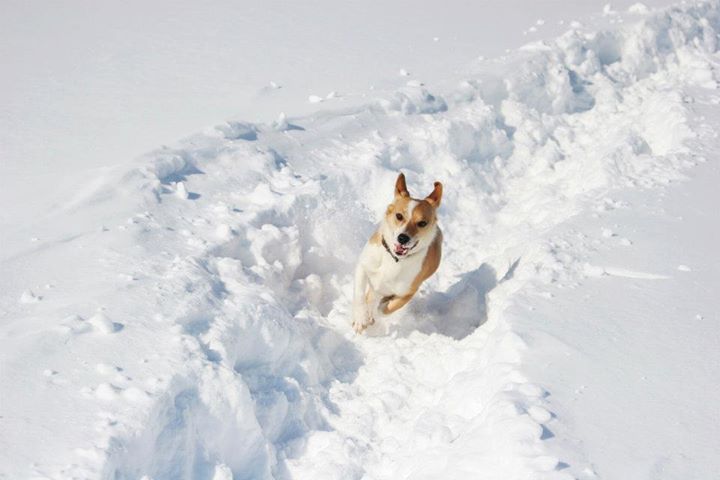
At first, I peed and pooped in the house, not realizing that such things should be done outside. But then I learned. I couldn’t unlearn to jump onto a sofa, though. As soon as everyone goes to bed, I must admit, I still immediately jump and make myself comfortable on a soft sofa or a chair. Sometimes in the morning, I forget to jump off, and people catch me at the crime scene. But they cannot get angry for a long time: I immediately lie on my back and raise my paws up (I learned how to manipulate from children), and everyone’s hearts are melting.
My life once almost ended. I ate a large amount of rat poison by catching a poisoned mouse. I was shaking and running from side to side, my muscles got tense, and I couldn’t relax them. It was nighttime and we didn’t have a car. Hasmik woke up our fellow taxi driver from Ashtarak and asked him to come urgently.
The driver was mortally afraid of dog hair. He was sure that every hair is a source of echinococcus. He also hated driving at night, especially when he already went to bed. But he arrived, and we went to the clinic. I had a terrible stench from my mouth, Hasmik tried to simultaneously hold my shaking body and a plastic bag, in case a miracle happened, and I would throw up, and the phone to call the veterinarian and ask him to come urgently to the clinic.
The driver took out a snow-white handkerchief and covered his mouth and nose with it. Sneakily, so that I would be offended. I didn’t care much, though, since I generally didn’t understand what was going on, but I wouldn’t mind either way: the stench was truly was abominable.
The vet said that the chances are low, but he would try. I spent two nights at the clinic. They injected into me everything that came across and didn’t let me eat. It was terrible, but I survived.
Now I live in a house, I have my own chair and delicious food. Everything is fine, but I have a panic attack when Hasmik leaves me. Even for five minutes. I know that she won’t abandon me, but I still panic and start to lick frantically. Orphaned children also have the same feature, by the way. Every time they have to ask: “Will you definitely come the next week”? Which truly means: “Or are you ‘temporary’, too?”
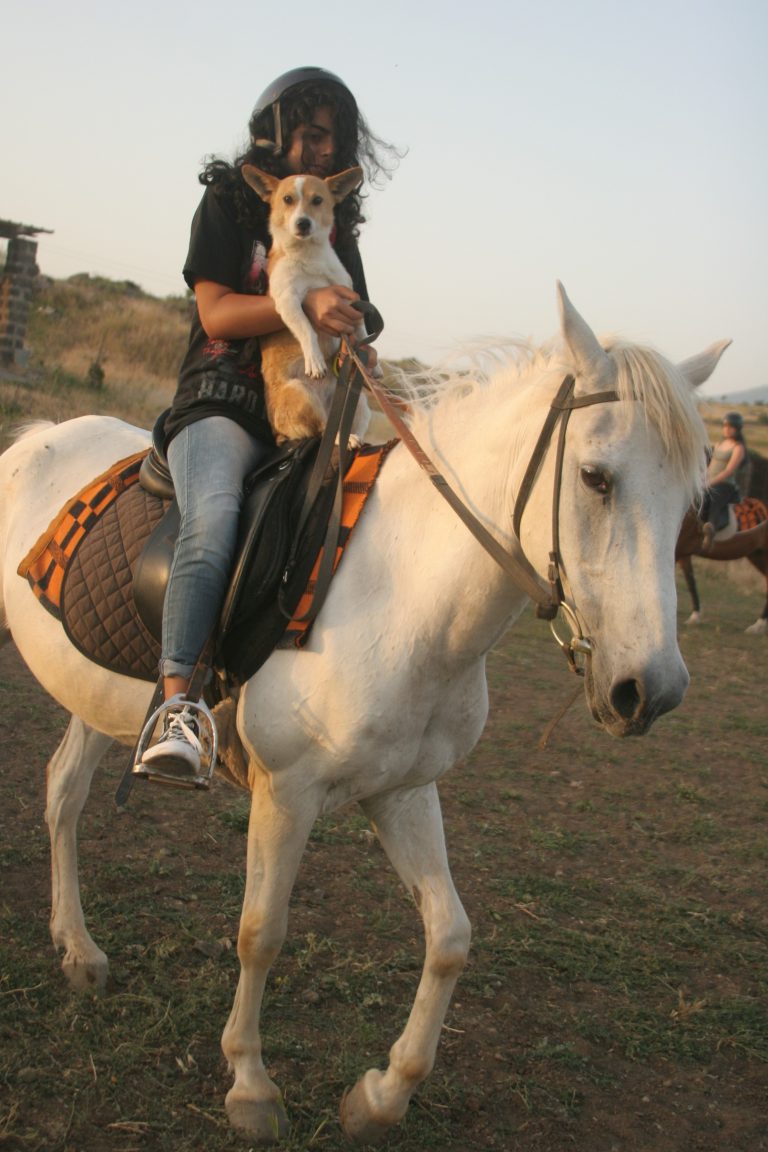
The day I almost gave up
Sometimes it happens that you can’t help feeling discouraged. Despair settles in your soul, and you cannot deal with it even by mouse hunting or eating snacks. Today in the orphanage met a new child — Maria, and today is such a day.
Maria has thin bloodless fingers. Cold, despite the August heat. Hasmik has to stroke them for a long time and taps on her wrist so that fingers that are clenched with spasticity into a strong fist would open up and touch me. I wait patiently in Ardem’s arms.
Maria likes to stroke me. I can see it in her eyes. Only eyes. Maria cannot walk, cannot move her hands, she has no facial expressions. But she has an absolutely intact intelligence. She has the ability to feel and perceive signals from the outside world, to experience and process them. And only eyes to express to the world what she has inside.
No one will ever tell her that she has cute dimples when she laughs. Because she doesn’t laugh. No one will ever like her sweet expression, because she has no expressions.
Behind her lively eyes is a huge world, which, perhaps, will not be revealed to us even in a hundred years.
Neither I nor anyone else can change this. Tear yourself up as much as you want. Maria is my first child with whom I feel powerless. Hasmik says how good she is, looks into her incredible eyes, strokes her shoulder, and smiles.
We finish the therapy and get into the car. On the way we buy tomatoes — bright, juicy, full of sunshine, people discuss busy traffic and crazy drivers on the road as if this is the most important thing now. We drop by friends, I meet other dogs there, and all of them think I’m antisocial.
I try my best, but I can’t communicate. My people skip from one topic to another, as if afraid to shut up. Probably, only sad thoughts emerge from silence.
We diligently pretend that everything is fine. But there is Maria who stayed in the orphanage. Maria who only has eyes. Everything breaks down and falls to pieces. It’s easier for people: they invented gods so that there is always someone to blame or ask for protection. We dogs don’t know how to do it. The only thing I want and can do is to run away into a dark corner and howl.
Being a therapy dog is sometimes extraordinarily difficult. You need to prepare your heart for the fact that it won’t always work out, that there will be days such as this one, to learn not to give in to despondency. Tomorrow I’ll tell all this to myself, but today I can’t. Today I am very sad.
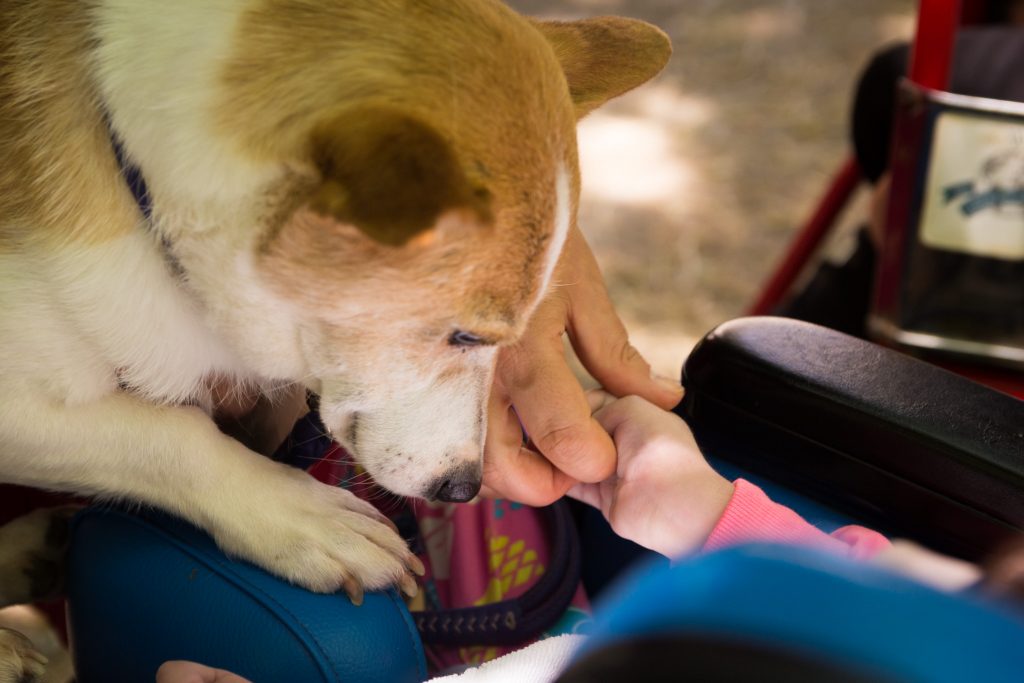
The day we faced the epidemic of pity
Today was definitely Archie’s finest hour. He is the exact opposite of me. For example, I never understood why I have to give paw or lie down as soon as someone wants to look at it. Proper communication happens when you look into each other’s eyes and stay silent. Or you embrace each other and sit quietly, and you feel good.
Archie is too noisy for proper communication. He is spinning this way and that, and all he needs is playing, kissing, petting, and doing exercise at all times. He sits down and gives paw, and lies down, sometimes even somersaults, and to get petted and treated with dog sweets.
Today, we worked with Leo at the orphanage. Leo has Down syndrome, and he is too sensitive. Any touch of a new “matter” for him can be traumatic.
Leo is a therapist on his own. At first, he came, sat nearby, and looked at me. Then crawled closer on his bottom. But as soon as I made a move towards him, he ran away immediately. On his bottom, too. He is aware of his fear, but he really wants to overcome it. And so, step by step, he moves towards the goal at his own pace.
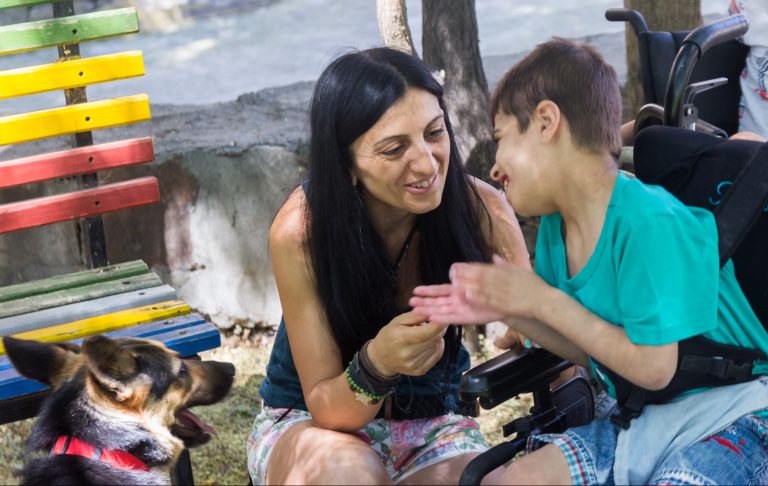
I immediately warned Archie that you need to be patient with Leo and not meddle with him right away too much. But Archie, of course, missed everything. The day is not over if at least one person remained indifferent to him. Therefore, he confidently approached Leo and poked his nose into his knee.
Leo froze in surprise. Then he brought the fingers gathered like a bow to his face and made a booming sound like a steamboat — the sign of incredible confusion. Having recovered, Leo thought it was time to run away, got his will back, and stayed. He even took Archie’s leash in his left hand. Archie lay beside him. So they studied each other for a while. After a couple of minutes, Leo slowly crawled to Archie and suddenly poked on Archie’s side with his finger. Then again he boomed desperately and quickly crawled back, communicating us with his whole self: something stunning just happened!
When we went to the crisis center later, there was a new little girl who was brought in the morning and didn’t say a word since then. Neither she smiled. Older children and educators recommended leaving her alone for today, suggesting that she might not be able to speak. When Hasmik offered her to pet Archie, the girl frantically shook her head. But when she was suggested to look at dog cookies with multi-colored jelly inside caused a weak interest.
Seeing the cookie in the girl’s hand, Archie didn’t stand ceremonially but jumped up and licked her on the palm of her hand. The girl looked at Archie and suddenly burst into laughter. Archie liked her and wanted to let her know that by licking her hands and face even more. The girl laughed louder, and started to pat Archie on the back, brought him water, combed his ears (which Archie courageously endured), fed him a million treats, and said that “the dog was good.”
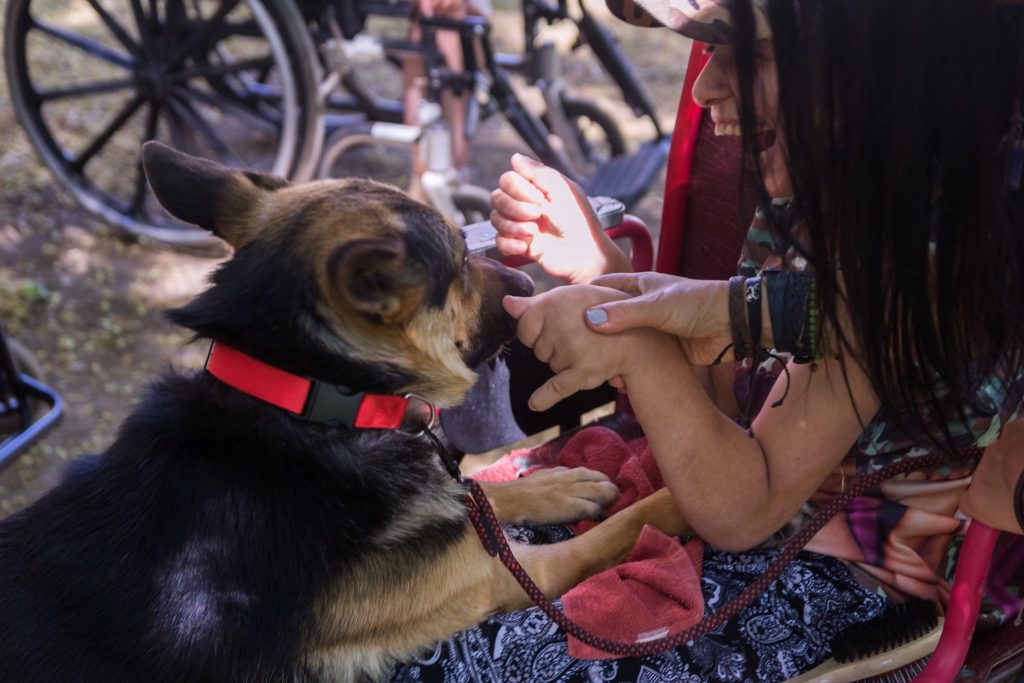
By the time we got to the city center and walked down the Northern Avenue, Archie was so captivated by the consciousness of his own importance that he would give autographs left and right — that is, if he could write. But the city didn’t greet him the way he expected.
Archie has bent forelegs, a consequence of the calcium problems he had in childhood. When he got to us, it was too late to do something, and since Archie could barely drag his legs because of this, Hasmik conducted a lengthy course of physiotherapy with him.
Now he walks, runs, and jumps. He just can’t dig the ground as we like to do when it’s hot. But Archie is an old bird. He waits until someone gets out of their hole to drink, or vice versa, to pee, and immediately takes a vacant place. He also needs to have rest from walking more than other dogs. Actually, that’s all there is to it.
But people don’t know about this.
For some reason, to them, it seems that it’s important to feel sorry for Archie, to be connected to the world of “suffering”. Some even say “thank you” to Hasmik for taking in the “poor and disabled” dog.
Archie doesn’t care about that, of course, but Hasmik does. Today, the city was especially prone to sentiment.
— God, the dog barely walks, and she forces him to, — one girl moaned, when Hasmik, already panting from the run, tried to stop Archie as he was pushing forward to get to a poodle in the distance — to say “hi”, evidently, and get to know each other.
— Gosh, mama jan, — muttered an elderly woman with a stroller, then tilted her head to the shoulder and … bit her dress. A few meters later, another woman did the same. This gesture in Armenia means something along the lines “May this horror pass and not affect my children.”
— Poor dog. Tormented. Sick. But is it worth keeping him in this state? This is not love, but egoism, — someone dived deep into the thinking process behind us.
— Let me go blind! — making huge eyes, a girl in uniform whispered to her friend, also in uniform.
— You don’t have to go blind, — Hasmik told her back. But the girl already had deep grief imprinted onto her face and remained indifferent to us.
Even a dog as joyful and full of life as Archie was discouraged by the barrage of compassionate exclamations and whispers addressed to him for some reason. Especially when he went to the next girl for pets and strokes, and she jumped away from him, put her hand to her heart and whispered: “My poor thing.” He glanced helplessly at Hasmik.
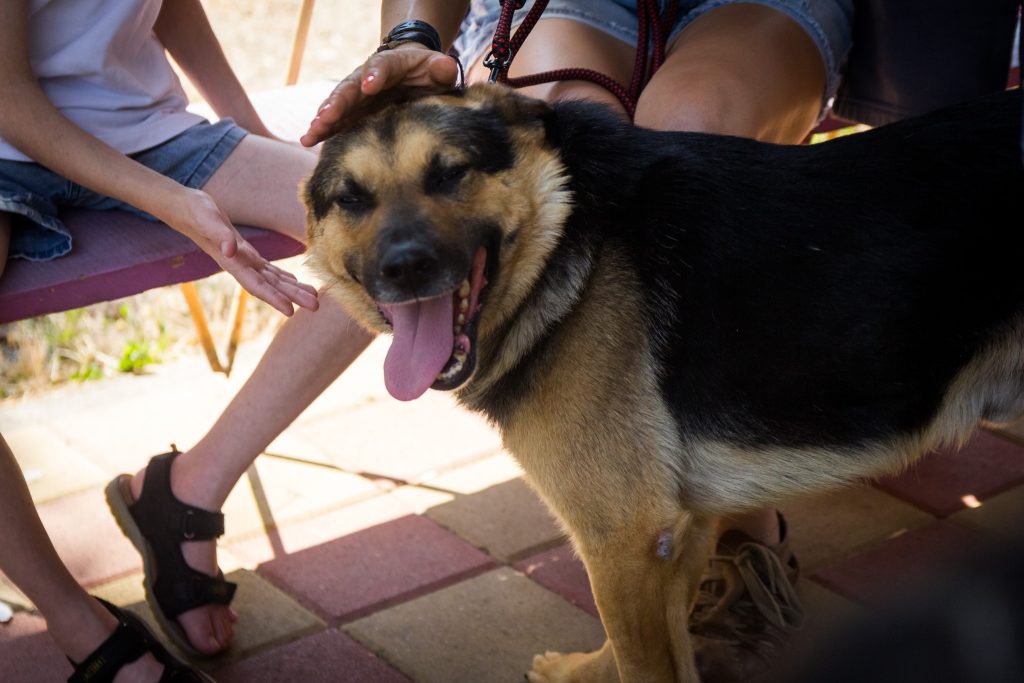
Hasmik began to explain to him for a long time that people are different, that they generally have problems accepting you as you are, and that you need to be patient in order to change this. But Hasmik couldn’t finish sharing her wisdom.
Archie saw a drinking fountain nearby, and the water from it was pouring onto the sidewalk. Archie absolutely loves lying in fountain puddles. Thus, his memory went blank again and switched to the newfound entertainment as he pulled the leash towards the water.
The day when I lay in my chair and thought about different things
Sunday. I have a day off today. It was raining in the morning, so it was cool and fresh. I stretched out in the chair and was enjoying my life. With Puchur on top of me, of course. He doesn’t really care whether you have a day off or not. I often even doubt: is he aware that I am a living creature, or does he think that I am a pillow that was put in place specifically for his convenience? Since he has chronic kidney failure, we all try to make his life as nice as possible.
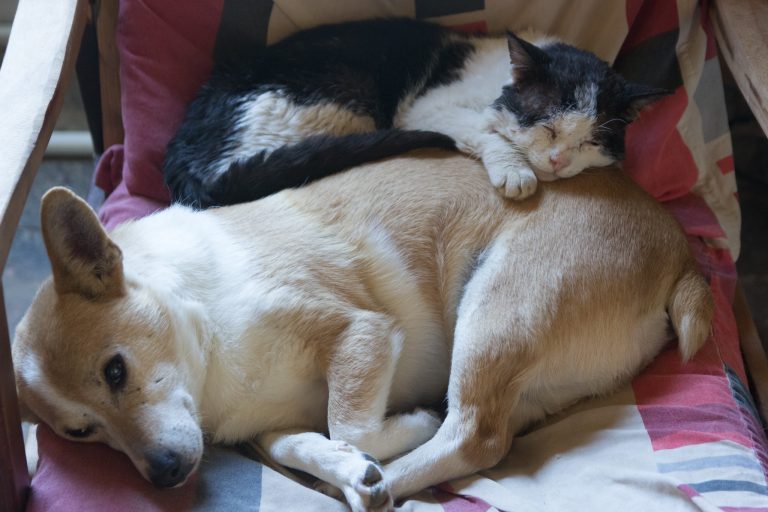
On Sundays we almost always have visitors. They say it’s very nice here, and that they leave full of joy, and rested.
Today we had one, and Hasmik was telling him how she came up with the idea of therapy with us in 2010. Back then people brought their children for therapy only with horses and considered us dogs living here to be useless creatures that only created more work and expenses. So as I say, it’s really important for people to know that everyone is beneficial to them in some way. And then Hasmik thought that it would be great to save street dogs, help them heal up the physical and mental injuries that they usually have, and then teach them how to help people overcome their problems in turn. This way people will think that dogs can be useful, and they will treat them better.
Hasmik shared this idea with a dog psychologist in Poland. The psychologist was unconditionally against it. It’s impossible to predict, he said, what behavioural problems can come up in a mutt. And he offered to give Hasmik a trained labrador and bring him to Armenia.
But Hasmik didn’t want a labrador. Purebreds are usually well off in life and get more affection, goodies, and care than us mongrels. I’m still lucky, I’m crossbred with a corgi. Everybody loves corgi. They even say some kind of queen loves them.
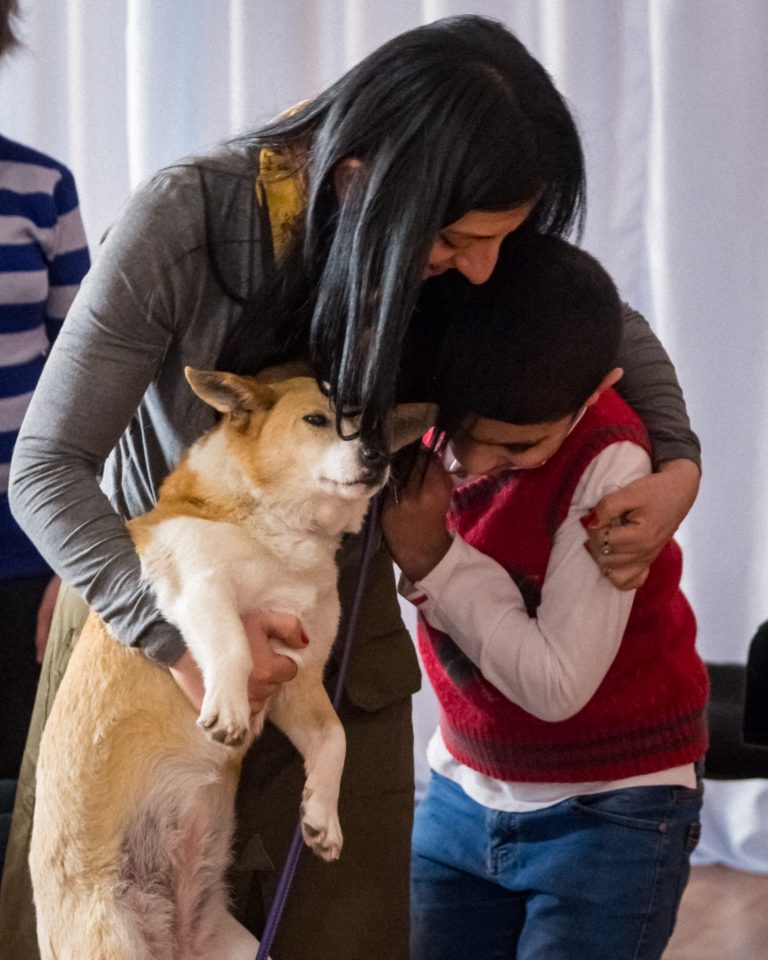
In the end, Hasmik decided that if the dog is calm, loves people and other animals, is not afraid of loud noises and tolerates being in the car well, then it does not matter what breed it is. She would just need more time and patience training the mutt.
For example, I was indifferent to people when I first got here. And hated cats. It took Hasmik a few months with me to teach me that cats should not be chased after and that people can be pretty decent.
But not everyone is as intelligent as I am. Hasmik fumbled with Malysh, another of our therapy dogs, for two years. But Malysh’s life was a nightmare. She was born in Yerevan. Her brothers and sisters were quickly adopted, but nobody wanted to take her because people considered her ugly. Most of all she was hated by a former KGB colonel who once even chased her with a gun when she was three months old. Hasmik adopted her to the family with two children and was happy for her. After all, everyone in that family was squeezing, kissing, and stroking her, which is usually a good sign.
Then Hasmik went on saving other dogs and stopped going to check on the puppy.
Six months later, it turned out that Malysh was kept on the balcony on the second floor (she is scared of heights to death) on a short leash, fed only with dry bread, and children sometimes were beating her with iron rods.
Hasmik immediately went there to pick her up. Malysh bit her hand, hid in a corner, and began to screech in horror, thinking that Hasmik would beat her up now, too. Hasmik had to throw a blanket over her to pick her up to avoid injury. She still made a lot of scars to other people and dogs afterward. She was scared of everything — even sounds; danger seemed to be everywhere.
Hasmik did not punish her but gradually taught her to trust people again. Even though it took two years, it was worth it. Now Malysh is the most affectionate dog in the world. Children do whatever they want with her, but she won’t even make a noise. Malysh is a living proof that there is nothing impossible, there are only lazy people.
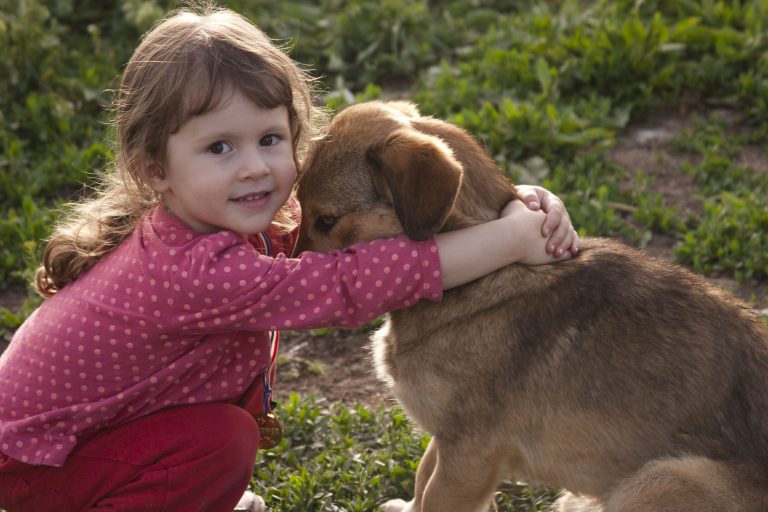
Coming back to my Sunday morning, Hasmik was telling the guest that the Polish psychologist came to Armenia three years after that conversation, observed our work with children and adults, and said that he was amazed by results. He also added that apparently Armenian mutts in some ways were special. Ha!
At first, children and adults were only visiting therapy in our village. We only started going to other centers and orphanages in a few years’ time. At first, everyone except the crisis center refused to work with us, making some kind of “sanitation” and hygiene as an excuse… As well as “fears” that children may experience. Now there are so many places where they want us, but we simply don’t have time.
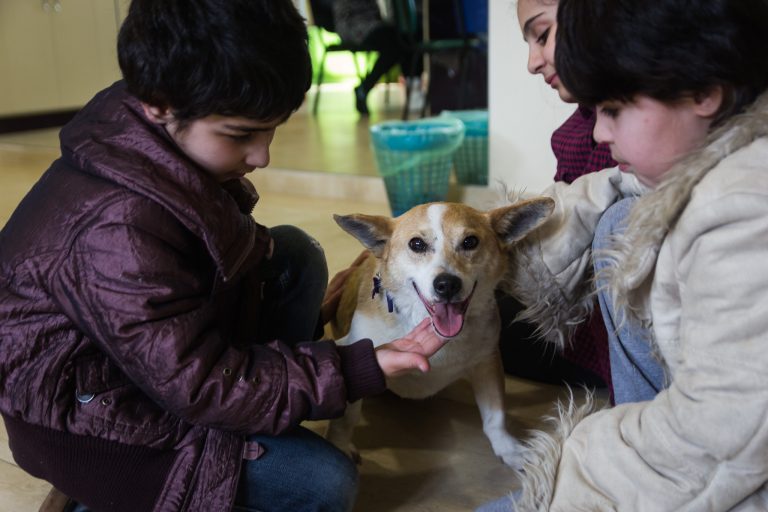
Hasmik and Fedor went with the guest to the kitchen to drink tea, and I moved to the kitchen door. I’m not allowed to enter the kitchen. I sat on the invisible threshold separating it from the living room, right in front of the guest’s chair, and began staring at his mouth, not blinking. When someone eats something, I can do this endlessly. I would easily become a champion in a no-blinking staring competition. Rarely does a mouth withstand such pressure for a long time. Crumbs, or even whole pieces, begin to fall from it. But this guest was impenetrable. I got only two tiny pieces.
Fedor put a bowl in front of me so that, as he said, I wouldn’t beg from the guest for leftovers. I sniffed the dry food, stood on my hind legs, and voiced my protest with a short “Woo!” At least on weekends you can give me a chicken bone or a piece of pork! But my protest, of course, was ignored.
The guest asked if we can jump over the hoop and do other tricks. But we are therapy dogs, not circus dogs. It’s a pity that I can’t explain to him in human language that tricks are something that gives you laughter for a few minutes, then you tell others what you have seen with amazement, only to forget about it later. And me — if I sit on your lap and let you hug me, and we stay like that in silence, you won’t forget this incredible feeling for a long time. Something inside you will definitely change.
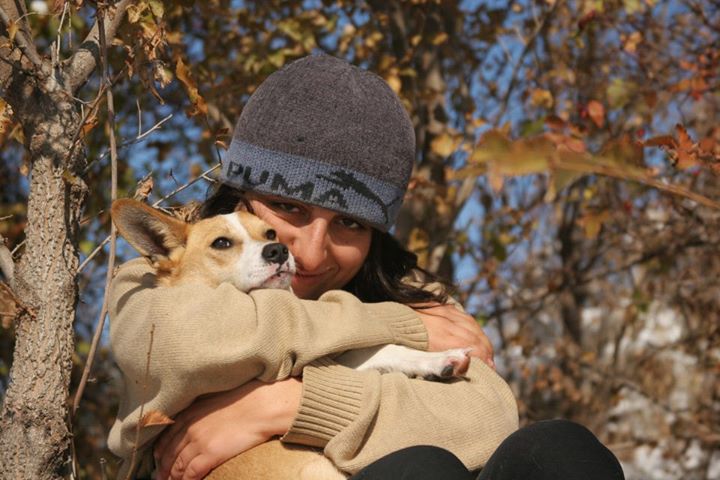
Why did I decide to share my diary with you? So that you can learn about my home and the very important business that we do. “Centaur” is a home for horses, dogs, cats and a turtle. We all had our own sad stories. Once people helped us change our lives, but now we help them. We are changing the way people think, their state of mind, and their relationship with themselves.
You can also participate in this important matter: for example, you can adopt some of us. But it must be a good happy house so that we are not very sad to leave. You can volunteer, helping to take care of us, over 50 animals living here. Or you can become our sponsor by sharing the cost of our meals, care, training, and medical care.
And then more people will be able to use the services of doctors without white coats, but with four legs and a tail. They don’t know how to give injections, prescribe the right pills, or cut with a scalpel, but they do have their own methods of treatment, sometimes helping better than traditional medicine.
Some names have been changed
Become a Patron
We are building a community of affectionate, non-judgemental people with an open mind. If you want to support our work of investigating the deepest social issues through personal stories of real people, the best way is to join us and become a Patron.
Text is over, story goes on
Here on Kalemon, we bring unspoken social issues to life in the form of narrative stories. Our mission is to create social impact by breaking taboos and freely discussing important matters, such as violence, poverty, discrimination, parental and medical ethics, and so on.
Kalemon is a non-profit online media that exists thanks to the financial support of individual people. Small, but regular donations from our readers help us write articles, train & recruit new authors, maintain and develop the website.
As little as 2 dollars per month can make a difference. Thank you!

Translation of the article was supported by the civic society support programme in Armenia by NESEHNUTÍ (Transition programme of Czech MFA)

